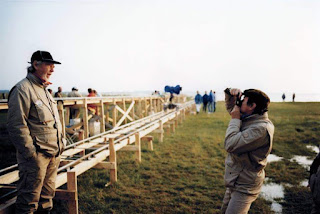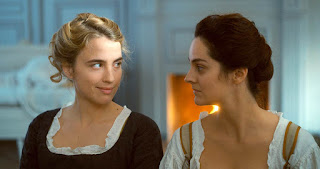Finally, I finished Andrei Tarkovsky's remarkable filmography, a body of work that is unprecedented in film history. Tarkovsky gave twenty-five years to his seven features and though his filmography is short yet each of them is more or less a masterwork. Man's dedication and devotion to his craft is simply mind-boggling.
Tarkovsky's films are encapsulated by sheer poetry exploring the human condition and analysing every minute nuances of vitality. Here's my ranking of his filmography in order of my preference:
7. SOLARIS (1972)
The 1972 classic, in a nutshell, is the encapsulation of sheer poetry and philosophy. Based on Stanislaw Lem's book of the same name, Tarkovsky traverses the conflicts of a cosmonaut through his journey to a space station revolving around an enigmatic planet. Tarkovsky's poetic pace might baffle one but it is one of the most pioneering and emphatic work ever committed to celluloid.
6. IVAN'S CHILDHOOD (1962)
Ivan's childhood marks the advent of film history's most celebrated auteur and provides a profound insight into his cinematic world. Unflinching in its portrayal of the turmoils of war, Tarkovsky's debut feature renders an illustration of a ravaged and desolate world through the eyes of a young boy, thus giving an innocent touch to it.
Dream sequences are present in abundance and it heavily elevates the movie, both symbolically and aesthetically. In what is one of the most mesmerising scene ever filmed, we see the shy yet elegant Masha take a leap to cross a chasm but Captain Kholin grabs her in the air and pulls her towards him and remarkably kisses her.
5. NOSTALGIA (1983)
Set in Italy, Nostalgia is Andrei's first movie shot outside of his homeland. Dipped in melancholy and following a non-linear narrative, Nostalgia through its phenomenal aesthetics captures the essence of time and space. It is the personification of a secluded man in this crazy, modernised and evolving yet unsophisticated world.
4. THE SACRIFICE (1986)
The Sacrifice marks an exemplary ending to one of the short yet momentous filmography. Andrei's culminating movie is a mythic blend of ethereal visuals and affecting philosophy, a threnody of vitality, cessation and the soul in its most spiritual form. The Sacrifice feels Bergman-Esque for the majority of its runtime since Andrei worked with Bergman's collaborators.
3. STALKER (1979)
To dream something of this magnitude is beyond my imagination. Stalker is an existential parable and a highly thought-provoking movie exploring various themes especially hope and faith. It is very captivating and has a melancholic and surrealistic tone as the decaying, rusting and crumbling remnants are marvellously dreamt, captured and put to screen.
2. ANDREI RUBLEV (1966)
Splitting the film into eight segments, Tarkovsky paints the life of painter Andrei Rublev in the atmosphere of medieval Russia, plagued by religious ambiguity, political inscrutability and turbulent rebellions. Watching Tarkovsky's sophomore feature is an immersive experience, which cannot be interpreted with few adjectives. The film is filled with loads of references to Russia's political and social history, which can only be comprehended on further rewatches and vast awareness of the country's culture. This is probably the first time, I saw in him shades of a novelist rather than a poet.
1. MIRROR (1975)
Directed by the God of cinema and based on the events of his life, Tarkovsky creates a meditation on memoirs and post and pre-war period. Zerkalo follows a nonlinear timeline with dreams and flashbacks from the perspective of a dying man. Tarkovsky willingly stirs between time contours, between fictional recreations and archive footage, between colour and black and white scenes, which generates confusion.
A hypnotic and unparalleled creation whose visuals hold unprecedented emotions and Tarkovsky has given so much of his existence to it that it is rather difficult to distinguish between fiction and reality as both blends in so beautifully. Mirror runs on memories and dreams and is fuelled by Tarkovsky's enigmatic cinematic power and by far remains my favourite work of the auteur.
Tarkovsky is arguably the greatest to ever grace the art form. His excellence will hardly be surpassed by any filmmaker, living or dead.











He was the greatest of them all, no contest. I saw Solaris in 1976, at the age of 17 and was profoundly affected by it. I'd have to wait another 43 years to see the rest of his films. They are simply put, unbelievable, incredible, astonishing. I wish he had lived longer, but what he gave us is without compare.
ReplyDeleteAlthough all his movies are the purest of gems and cannot be competed with each other but according to me, Stalker should be his best work.
ReplyDelete... it is indeed difficult if not next to impossible to rank Tarkovskiy´s creations, it perhaps also depeds on one´s personal taste ... however, I will never forget the awe I felt after watching Andrey Rublyov ... not many movies left such an unforgetable impression on me ...
ReplyDelete